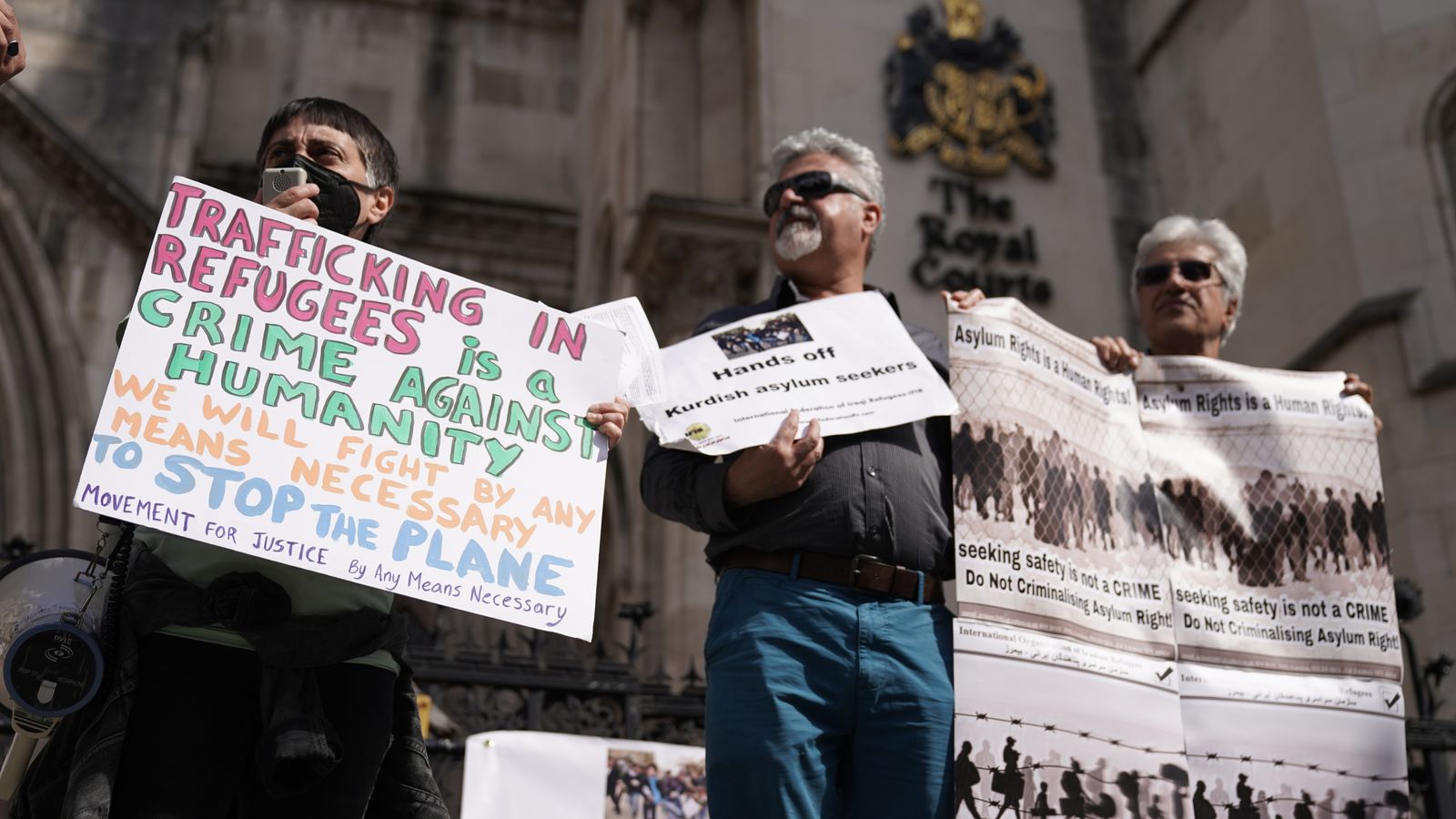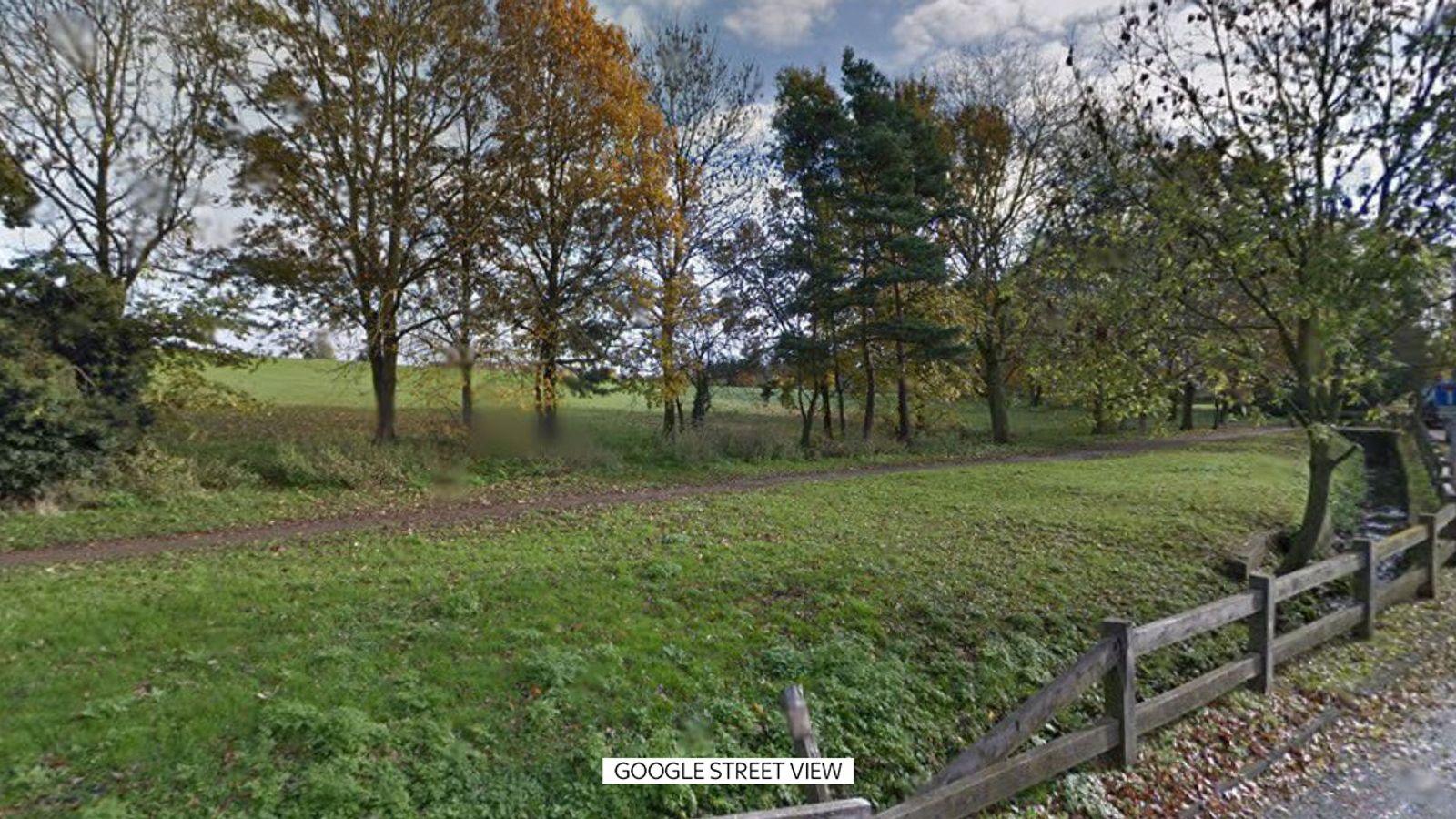A legal challenge into the government’s immigration policy that would send some asylum seekers to Rwanda has begun in the Court of Appeal.
Last week, the High Court ruled the first flight to the African country carrying individuals who are seeking asylum in the UK could go ahead tomorrow – but is now facing a fresh legal challenge.
The Public and Commercial Services union (PCS), which represents around 80% of Border Force staff, has brought the case, alongside charities Care4Calais and Detention Action.
The policy is also being challenged by Asylum Aid, which has asked for an immediate injunction to halt the flight.
As of Friday, around 130 people have been told they could be moved to Rwanda under the new scheme.
There are 11 people scheduled to be on tomorrow’s flight, although Lord Justice Singh suggested the numbers could now be in single figures.
Downing Street has refused to say whether the flight to Rwanda on Tuesday would be cancelled if it was too empty.
Migrant deportation plan: ‘It’s really hard to get work’; ‘I don’t feel safe’; ‘People here are so welcoming’ – What it’s like to be a refugee in Rwanda
Rwanda calls for UK deportation scheme to be given ‘a chance’ after Prince Charles ‘says policy is appalling’
Rwanda deportation plan: Prince Charles ‘says policy is appalling’ as court rules first asylum seekers can be sent away
Raza Husain QC, for two people at risk of removal and the three organisations challenging the policy, said Mr Justice Swift’s decision last week contained errors of principle or was “plainly wrong”.
He focused on the United Nations High Commissioner for Refugees’ concerns about Britain’s asylum flights.
Lawyers for the two charities and PCS union appealing Friday’s ruling said the policy “was absolutely and plainly wrong” as it had “a serious interference with dignity”.
The UN refugee agency, the UNHCR, holds an unequivocal position that the flight should not proceed.
Mr Husain said in written submissions: “The policy presently involves executive detention, forcible removal from the jurisdiction, transportation to a country from which they have not sought protection and to which they do not wish to go, in circumstances where the individuals concerned are exercising a legal right; and their removal is intended to deter others.
“This amounts, on any view, to a serious interference with basic dignity… where those individuals have already suffered significant trauma and have mental health issues.”
Mr Husain said that judge Mr Justice Swift did not correctly decide how strong the claimants’ case was and wrongly made a decision about the “balance of convenience”.
The barrister told the court: “We say the judge erred in his assessment of the legal strength of our case where in respect of ground one, we say it was unanswerable and effectively conceded by the Secretary of State.”
‘Asylum seekers are particularly underprivileged and vulnerable’
He said it was “abundantly clear” the Home Office’s view that Rwanda is a “safe third country” for asylum claims “was predicated on a complete misunderstanding” of the views of the UNHCR.
Mr Husain said asylum seekers “must be seen as a particularly underprivileged and vulnerable population group”.
He said there is evidence of risks to individuals citing a UNHCR example of protests by refugees in Rwanda against food ration cuts in 2018, adding that “12 individuals were killed, 66 were arrested and some remain detained”.
Therefore, the United Nations High Commissioner for Refugees is “concerned that persons of concern relocated from UK to Rwanda may be at significant risk of detention and treatment not in accordance with international standards should they express dissatisfaction through protests after arrival”.
Mr Husain told the packed courtroom that British law says it has “never been a criminal offence to arrive in the UK without relevant documents”.
It was argued that proposals were of a last-minute nature – the meetings between UK and Rwanda began in January and the policy was announced in May.
He also said the timeline of the plans does not indicate urgency to get the asylum seekers’ applications moving and “there was no evidence of deterrence”.
Prince Charles is said to have privately called the UK government’s plans “appalling”.
But Boris Johnson has again defended the government’s controversial policy, claiming the move is necessary to stop illegal people-smuggling rackets on either side of the Channel.
The prime minister’s official spokesman was asked whether the flight would go ahead if numbers were low and said: “I’m not aware of there being a set limit.
“You have seen we have a flight due tomorrow still, you’ll know from reporting that there is a significant number of legal challenges but we’re not giving a sort of running update of numbers.”










